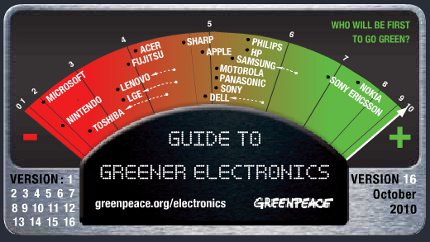Greenpeace released its 16th Guide to Greener Electronics this week, and there have been a few pretty major changes from the last rankings, published earlier this year.
The biggest fall was by Apple, who tumbled past the competition from fifth to ninth. The company - which makes efforts to emphasise the green credentials for all its products - lost major points for failing to disclose information on supply-chain waste management or its stance on RoHS 2.0 restrictions.
The biggest climbers were HP, who climbed from eighth to fourth, and Samsung, who jumped from thirteenth to fifth. The world's largest PC maker managed to make improvements in reducing the quantities of PVCs and BFRs in its computers as well as committing to remove beryllium from all products by the middle of 2011. Samsung achieved its meteoric rise as a result of previous penalty points - imposed for backtracking on commitments - being removed.

Nintendo has retained the bottom spot, which it has held for much of the history of these rankings. A failure to implement timelines and publish guidance on when it will phase out certain chemicals as well as a unsatisfactory record on e-waste have resulted in the poor ranking.
The top of the table remains largely unchanged, with Nokia, Sony Ericsson and Philips holding onto the top three spots. Nokia was especially singled out for having an excellent track-record on environmental issues.
The full rankings, as well as explanations of where each company scored well - or not so well - are available from Greenpeace.













